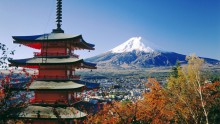Ukraine and Japan are marking the 25th anniversary of the establishment of diplomatic relations between Ukraine and Japan. In addition, our country will celebrate another important event this year, as it will hold the Year of Japan in Ukraine. The decree to that effect was signed by President of Ukraine Petro Poroshenko at the beginning of this year.
In his speech on the occasion of this event, Ambassador of Japan to Ukraine Shigeki Sumi stressed that Japan was the only Asian country to have imposed sanctions on Russia over its occupation of Crimea and the war in the Donbas. Also, Prime Minister of Japan Shinzo Abe visited Ukraine in 2015 in the first such visit in the history of diplomatic relations between the two countries, while president Poroshenko visited Japan in 2016.
In turn, the president of Ukraine commended Japan’s role in carrying out decisive structural reforms and thanked Japan for financial assistance, including 1.8 billion dollars it provided in 2014-16 to fund reforms of the law-enforcement system and creation of the new police service, judicial reform, and implementation of a number of environmental programs. The head of state also stressed the symbolism of the fact that the Year of Japan in Ukraine would coincide with the 25th anniversary of the establishment of diplomatic relations between the two countries, because this event “has to become an important milestone in the Ukrainian-Japanese bilateral relations, will facilitate the rapprochement of our cultures and peoples, and enhance people-to-people contacts.”
The Year of Japan in Ukraine was prepared in advance. In particular, the Institute of World Policy prepared the report “Foreign Policy Audit: Ukraine-Japan,” which summed up the relationship between the two countries during the past quarter century.
In particular, it states that Japan has always declared its interest in the development of democracy and market economy in Ukraine. “Nevertheless, this active position of Japan as one of the global leaders has become even more evident during the war between Ukraine and Russia. The policy on Russian aggression against Ukraine, implemented by the Government of Japan, is based on understanding that Moscow’s policy affects the security not only in Europe, but also in Asia and, therefore, is an issue of global politics, not a regional phenomenon,” the study reads.
Statements and declarations of the Japanese government were underpinned by clear practical steps. Firstly, Japan was one of the initiators of the idea to develop an action plan to assist Ukraine at the G7 level in 2014. Secondly, since 2004, Japan has implemented 103 projects in Ukraine with a total value of 7.5 million dollars, which provided free grant assistance for renovation of schools and procurement of necessary medical equipment for district hospitals. Thirdly, the Japanese government announced a package of economic and technical assistance for Ukraine in the amount of 1.8 billion dollars in 2014, “the most critical period of countering Russian aggression.”
The Institute of World Policy notes that the overall amount of assistance provided for almost a quarter century of existence of bilateral relations has reached three billion dollars.
Another unfailing priority of the Ukrainian-Japanese relations has been the issue of nuclear safety. Japan has repeatedly provided funds for the establishment of a spent nuclear fuel storage facility in Chornobyl, intended to store the Chornobyl Nuclear Power Plant’s nuclear waste, and helped victims of the Chornobyl accident through the procurement of equipment and medicines. “Such activity demonstrated by Japan in relations with Ukraine in terms of nuclear safety is determined by the desire to contribute to international peace and security through dissemination of high Japanese standards of nuclear non-proliferation and control of nuclear materials, as well as by the historical identity of the country that experienced Hiroshima and Nagasaki.”
The Day’s editor-in-chief Larysa Ivshyna has repeatedly pointed to importance of following Japan’s example for Ukraine. In particular, she says in her article “Identity and Modernization”: “After no other trip abroad did I leave with the feeling that the country I had seen was somehow very much like Ukraine, and at the same time in no other country was it so evident at what historical crossroads our ways had diverged dramatically.”
The Day asked Ambassador of Ukraine to Japan Ihor KHARCHENKO to comment on the significance of the Year of Japan in Ukraine and achievements in relations between the two countries.
“To allow you to better understand the importance of Ukrainian-Japanese relations, I will simply repeat the words of my Kyiv-based colleague, Ambassador Shigeki Sumi: Japan was the only Asian country to have imposed sanctions on Russia in response to Russia’s aggression against Ukraine. It still adheres to this position. Meanwhile, the Japanese government has been probably the largest international contributor to the process of economic reform in Ukraine. Looking back at 25 years that have passed since the establishment of diplomatic relations between Ukraine and Japan, our relations are now experiencing the most active political upswing and involving real partnership. It is therefore only logical and natural to celebrate the ‘diplomatic anniversary’ in that unusual, but totally understandable to everyone manner, by holding the Year of Japan in Ukraine. We are distant geographically, but are actually almost next door to each other, divided only by that aggressive neighbor whom we are trying to teach to respect international law.”









